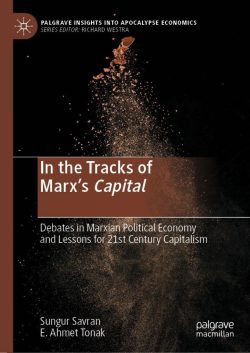Karl Marx labored for twenty-five years on his analysis of the laws of motion of the capitalist mode of production. For Marx, this was not merely an intellectual enterprise, but a political one—to provide a rigorous historical and theoretical explanation of why capitalism was a fundamentally unreformable social system based on exploitation, accumulation, and competition, and was doomed to periodic crises that make hopes of reforming the system utopian. While Marx prepared only the first volume of Capital for publication, his friend and comrade Friedrich Engels edited his extensive notes for the second and third volume. Their pupil, Karl Kautsky, prepared the fourth volume, Theories of Surplus-Value, after Engels’ death. Despite never finishing his work, Capital and Theories remain the highpoint of Marx’s scientific achievements. Marx not only settled accounts with the classical political economists (in particular, Smith and Ricardo) but provided an analysis of the necessary relations and processes of capitalist society. Despite numerous, and often deliberate, misrepresentations by purported friends and foes alike, Marx’s arguments in Capital have remained the focal point of the continuing debates on the origins, dynamics, and future of capitalism. For those working in Marx’s tradition, Capital is neither a mere “historical text” applicable only to one phase in the history of capitalism, nor a sacred text that must be defended blindly. Instead, it continues to inspire theoretical and empirical research on capitalism as a distinct form of social organization.1Clearly, it is not possible to cite the enormous literature shaped by Marx’s Capital, but we can highlight the contributions of economists like Anwar Shaikh and Michael Roberts, historians such as Robert Brenner and Ellen Meiksins Wood, and theorists of the working class (Howard Botwinick), gender (Lise Vogel), and racial oppression (W. E. B. DuBois).
It is in this context that Sungur Savran and E. Ahmet Tonak’s collection of essays, In the Tracks of Marx’s Capital, present an excellent and timely contribution to our understanding of Marx’s work, especially as capitalism remains mired in depressed profitability and stagnant accumulation since the 2008 global financial crisis. The two Turkish economists, longtime comrades and collaborators, have made important contributions to Marxist analysis over the last four decades. Savran participated in the debates on Sraffa’s neo-Ricardian critique of Marx’s value theory in the 1980s, along with Anwar Shaikh and the late Ernest Mandel, while maintaining political and intellectual activity in Turkey despite state repression.2Ernest Mandel and Alan Freeman (eds.), Ricardo, Marx, Sraffa: The Langston Memorial Volume (London: Verso, 1984). Tonak, who studied at the New School for Social Research with Shaikh and coauthored the seminal Measuring the Wealth of Nations: The Political Economy of National Accounts, has taught and published extensively in both the United States and Turkey.3Anwar M. Shaikh and E. Ahmet Tonak, Measuring the Wealth of Nations: The Political Economy of National Accounts (New York: Cambridge University Press, 1994), https://doi.org/10.1017/CBO9780511528330.
This collection of essays (many previously unpublished in English) is a vigorous defense and elaboration of Marx’s method, theory, and ability to explain the concrete history of capitalism. The essays are grouped into four sections on different aspects of Capital. The first section contains six essays discussing Capital’s place in the history of economic theory and Marx’s own theoretical and political evolution. There, they defend a Hegelian reading of Capital against more mechanical interpretations (Althusser, Analytic Marxism) that are unable to grasp either the historicity of capitalism or its turbulent laws of motion. The second and third sections provide a rich theoretical and empirical case that Marx’s analysis is not limited to one “stage” or “type” of capitalism but allows us to grasp the basic dynamics of the system throughout its history. Four essays operationalize the categories of Capital demonstrating, counter to the claims of David Harvey and others, that Marx’s value theory is not too “abstract” to explain the concrete historical reality of capitalist development. Using the methods he and Shaikh developed to convert national income accounts into Marxian categories, Tonak and his collaborators explore “profit on alienation,” the net social wage, the exploitation of unproductive workers, and the relative vulnerabilities of capitalist economies to crises of profitability. Finally, four essays deploy Capital to analyze such diverse aspects of twenty-first century capitalism as the production of surplus value by digital platforms like Facebook, the reorganization of work through lean production, contemporary imperialism, and the roots of the current capitalist crisis.4For reasons of space and because the disagreements between Marxists and neo-Ricardians are no longer a central focus of Marxian and radical debate, I will not discuss Savran’s brilliant critiques of the neo-Ricardian economists. The decline of neo-Ricardian influence took place, in large part, because the neo-Ricardian theory of capitalist crisis, in which worker militancy produces a “profit squeeze,” is clearly inadequate to explain the current crises of profitability after forty years of working-class retreat.
In Tonak’s lucid essays discussing the Grundrisse—the notebooks Marx drafted between 1857 and 1858 in preparation for Capital—and in Savran’s introduction of the three volumes of Capital, the authors argue that Marx’s “scientific theory that explains the mechanisms through which the modern economy works” emerges from a “critique of political economy” (33). Put another way, Marx’s contributions to economic theory emerge through an engagement with—and transcendence of—the works of Smith, Ricardo, and the classical tradition in economics. Smith, Ricardo, and their contemporaries attempted to produce a scientific account of modern society that “did not make do with the outward manifestation” of capitalist social relations (59), unlike those whom Marx labelled “vulgar economists” (the founders of “neo-classical economics”) who idealized the workings of the market. However, Marx located the limits of the classical tradition in their treatment of capitalism as an “eternal form of production” (40) that was “adequate to human nature” (63).5Brenner and Wood make a similar criticism of the classical traditions, in particular Smith’s account of the origins of capitalism. Robert Brenner, “The Origins of Capitalist Development: A Critique of Neo-Smithian Marxism” New Left Review I/104 (July-August 1977), 25-92, https://doi.org/10.64590/9sc; Ellen Meiksins Wood, Democracy Against Capitalism: Renewing Historical Materialism (New York: Cambridge University Press, 1995), Part I.
Only by historicizing capitalism as a social form with an origin and possible endpoint could Marx resolve the varied contradictions in the classical tradition on the nature of value, the origins of profit, the dynamics of accumulation, and the determinants of crises of profitability.
Savran and Tonak also convincingly argue that Marx’s critique and transcendence of classical political economy in the Grundrisse and Capital was only possible because of his critical appropriation of Hegel’s dialectical method. While the German idealist viewed human history as the increasingly seamless unfolding of the “absolute spirit,” Marx, the militant materialist, rooted the dialectic in contradictory social production and reproduction as a whole. Only by understanding the contradictory nature of capitalist social relations in their totality could Marx grasp the possibility of the transcendence of this social form. As other, Hegelian-influenced readings argue, Tonak and Savran point to how Marx’s materialist dialectic of essence and appearance allowed him to move beyond a simple debunking of erroneous theories, but to grasp why capitalism appears as “an indispensable technological factor of the production process in all forms of social organization,” rather than a historically constituted “relation of production” (77). Capitalist social relations subordinate the direct producers to the dominance of the commodity, producing “commodity fetishism”—the inversion of subject and object that makes the social interdependence of producers necessarily appear as the interactions of commodities. By grasping the duality of capitalist production—as both a concrete labor process and an abstract valorization process—Marx can explain why all social relations under capitalism, including the relationship between capital and labor, appear as relationships between abstractly equal commodity-owners without resorting to notions of “false consciousness” and ideological manipulation.


